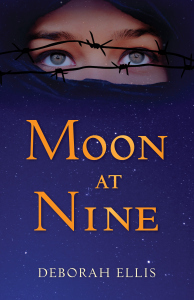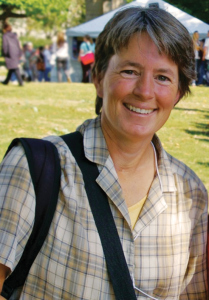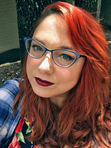Pride Week Guest Post from Deborah Ellis: What Matters
One of the benefits of writing for young people is getting invited into schools. For the last decade I’ve been welcomed into schools across North America, Asia and Europe. Speaking with kids about books, reading, world issues and how we can learn to make better choices that will result in a kinder planet is a real challenge and joy for me.
I’ve done a lot of this and am quite comfortable talking about the themes of many of my books – such as the damage war does to people and society, the crime of allowing diseases like AIDS and leprosy to go untreated when the planet has the resources to get the medication to everyone who needs it. But with my latest book, MOON AT NINE, I’ve been nervous.

Pajama Press, June 2014.
I am a 53 year old lesbian. This is something I embrace with joy and pride, but have not talked about it in schools. Partly, this is because I am invited in by a teacher who uses my books in her classroom, and once I leave, she has to deal with the fall out of the visit. She’s been kind to me so I want to not make her life more difficult in return. The other reason I don’t talk about it is that it does not naturally come up in a presentation. Sometimes I’ll get a question about whether or not I have a husband, and all I say to that is “no”.
But MOON AT NINE is different. It is based on the true story of two teenaged girls in Iran in l988. These girls attend a school for gifted girls in Tehran. They form a very close friendship and they fall in love. And people find out.
In the Iran of l988, just like the Iran of today, being lesbian or gay is against the law. There are over 70 countries today where this is the case, where who you are and who you love can land you in jail for a very long time, perhaps even the rest of your life. In seven countries, including Iran, being lesbian or gay can land you the death penalty. It is estimated by human rights organizations that since l979, over 4000 lesbian and gay Iranians have been put to death. I don’t expect they had much of an easier time before l979, during the reign of the murderous Shah.
I was faced with a choice when I talked about this book – to keep the talk to the book, and therefore removed from myself, or to talk about my own experience of being lesbian. I wasn’t sure what I would do.
The first school I went to after MOON AT NINE came out was a Catholic school in a small city in Ontario. The sixth, seventh and eighth grades were assembled in the gym. The portion of the talk about war was over. I held up MOON AT NINE, with its striking blue cover, and wondered what would come out of my mouth.
“My wife has cancer,” I said. “She is in the middle of chemotherapy. We go back and forth to the cancer hospital in Hamilton, and on each visit, when they check her in against the information they have in their charts, they say, ‘And your partner, Deborah Ellis, is here with you. Excellent.’ They don’t make her lie, they don’t make her feel ashamed, and I am welcomed into the waiting rooms and chemo suite with the same grace and gentleness that husbands, fathers and mothers are. I am treated just the same, and, more important, my wife is treated just the same. This came about because of decades of struggle and work by the people who went before us. And in many countries, being lesbian or gay can still get you killed.’”
The book was shaking in my hand as I spoke, and I was sure my heart was beating loud enough to drown out my words. I said a few more words about the writing of MOON AT NINE, then I took questions.
There was silence in the room. No hands went up. I feared the worst, that my bombshell was going to get the microphone yanked out of my hand, I’d be booted out to the parking lot and the teacher who so kindly invited me would lose her job.
Then I saw a hand.
I managed a smile and a nod that the kid should ask his question.
“So – why did you want to become a writer?”
A normal question from a kid at an assembly. I answered him. Another hand went up.
“How many books have you written?”
Another normal question.
“Do you draw your own covers?”
It went on and on. The questions were about writing and war and did I have any pets? Nobody asked about me being lesbian.
They just didn’t seem to care. My being lesbian was the least interesting thing to them. There was the whole world to talk about, so we talked about that instead.
At the very end of the session, as kids were filing out of the gym to go back to their classrooms, a tiny little girl came up to me. She was one of the great readers from grade 4 that had been allowed to come to the assembly. I had to bend down to hear her quiet voice.
“I hope your wife gets better,” she said. I almost cried.
I owe so much to all those who went before us, paving the way for me to be able to live my life openly and honestly. I owe so much to all those who are today continuing to fight the good fight for liberty and justice for all.
Happy Pride, everybody!

Deborah Ellis.
Deborah Ellis is the internationally acclaimed author of nearly thirty books for children and young people, most of which explore themes of social justice and courage. A peace activist, feminist, and humanitarian, Deborah has won many national and international awards for her books, including the Governor General’s Award, the Ruth Schwartz Award, the Vicky Metcalf Award, the American Library Association’s Notable List, and the Jane Addams Children’s Book Award. In 2010, she received The Ontario Library Association President’s Award for Exceptional Achievement. Deborah lives in Simcoe, Ontario, with her wife.








